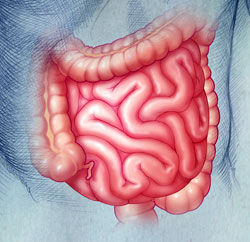 Crohn’s disease, also known as inflammatory bowl disease, is a chronic autoimmune disease, meaning the immune system attacks the body’s own cells. Although it can occur in any part of the gastrointestinal tract, the condition usually occurs in the ileum, which is the part of the gastrointestinal tract where the small and large intestines meet. Crohn’s disease can cause inflammation, thickening of the intestinal wall and the formation of deep ulcers.
Crohn’s disease, also known as inflammatory bowl disease, is a chronic autoimmune disease, meaning the immune system attacks the body’s own cells. Although it can occur in any part of the gastrointestinal tract, the condition usually occurs in the ileum, which is the part of the gastrointestinal tract where the small and large intestines meet. Crohn’s disease can cause inflammation, thickening of the intestinal wall and the formation of deep ulcers.
Symptoms of Crohn’s include abdominal pain, fever, diarrhea, loss of appetite, weight loss, abdominal mass, abdominal sounds (like gurgling or splashing), fatigue, gastrointestinal bleeding, foul-smelling stools and pain passing stool. Your physician can make a diagnosis through a physical exam. Additional tests, like endoscopy, colonoscopy or sigmoidoscopy, small bowel follow-through, barium enema, upper GI series, capsule endoscopy (pill cam), or stool culture, may also be necessary.
FAQs
The only known risk factors include a family history of the disease, Ashkenazi Jewish ancestry and smoking. The highest risk periods of its occurrence are during adolescence and early adulthood.
Your physician can prescribe a variety of medicines to control inflammation, as well as antibiotics, if needed, to treat abscesses or fistulas (abnormal connections that occur between the bowel and adjacent organs). If these treatments are not effective, surgery may be required to remove the diseased portion of the intestine.
Since its cause is not fully understood, it isn’t possible to control Crohn’s without the use of prescription medication. However, it is important to eat a well-balanced diet with adequate calories, vitamins and protein. If there are foods that worsen diarrhea, you should avoid them. You may also need to stay away from raw fruits and vegetables if you have an intestinal blockage. If you have difficulty digesting lactose (milk sugar), you also need to avoid milk products.
Food problems can vary greatly from person to person, so be sure to consult with your physician to discuss the specifics of your situation.
Yes. Skin rashes, fistulas, liver inflammation, joint disease (like arthritis), eye inflammation, kidney stones and clotting problems can all result from its effect on other organs
No. Crohn’s is a chronic illness, which means patients fluctuate between periods of improvement and feeling better and those when their symptoms are worse. You should schedule regular visits with your physician to closely monitor your condition.